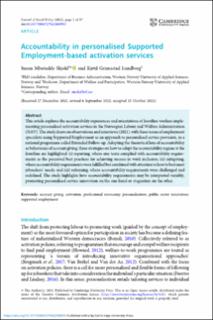Accountability in personalized Supported Employment-based activation services
Peer reviewed, Journal article
Published version
Permanent lenke
https://hdl.handle.net/11250/3057965Utgivelsesdato
2022Metadata
Vis full innførselSamlinger
Sammendrag
This article explores the accountability experiences and orientations of frontline workers implementing personalised activation services in the Norwegian Labour and Welfare Administration (NAV). The study draws on observations and interviews (2021), with three teams of employment specialists using Supported Employment as an approach to personalised service provision, in a national programme called Extended Follow-up. Adopting the theoretical lens of accountability as behaviours of account giving, three strategies on how to adopt the accountability regime at the frontline are highlighted: (i) reporting, where one team complied with accountability requirements as the perceived best practices for achieving success in work inclusion; (ii) mitigating, where accountability requirements were fulfilled but combined with attention to how to best meet jobseekers’ needs; and (iii) reframing, where accountability requirements were challenged and redefined. The study highlights how accountability requirements may be interpreted variably, promoting personalised service innovation on the one hand or stagnation on the other.

